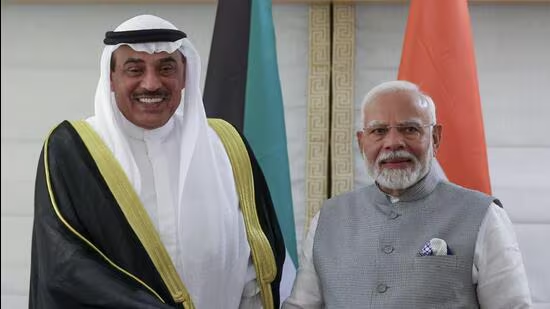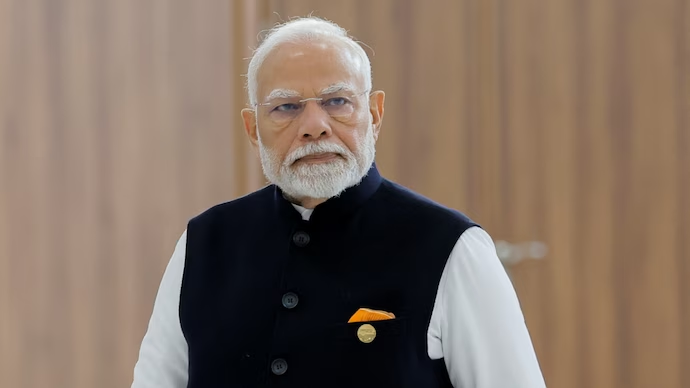Prime Minister Narendra Modi is set to visit Kuwait today, marking a historic occasion as the first visit by an Indian Prime Minister to the Gulf nation in 43 years. This highly anticipated trip underlines the growing importance of India-Kuwait relations and aims to deepen cooperation in areas such as trade, energy, labor, and strategic partnerships.
The last Indian Prime Minister to visit Kuwait was Indira Gandhi in 1981. Since then, the two nations have maintained strong ties, but PM Modi’s visit signals a renewed focus on elevating the bilateral relationship to new heights. His visit comes at a time when both countries are seeking to expand collaboration amidst shifting global dynamics and regional challenges.
A Strategic Partnership in the Gulf
Kuwait, a key player in the Gulf Cooperation Council (GCC), has been a reliable partner for India in terms of energy security and trade. The country is India’s ninth-largest trading partner, with bilateral trade exceeding $12 billion annually. India imports significant amounts of oil and liquefied natural gas (LNG) from Kuwait, making it a vital source for India’s energy needs.
PM Modi’s visit is expected to focus on bolstering energy ties by exploring long-term agreements for oil and gas imports. Additionally, discussions on renewable energy cooperation are anticipated, as both nations look to diversify energy portfolios in line with global sustainability goals.
Focus on Indian Diaspora and Labor Agreements
With over 1 million Indians residing in Kuwait, the Indian diaspora forms the largest expatriate community in the country. These individuals contribute significantly to Kuwait’s economy, particularly in sectors like healthcare, construction, and domestic work, while also sending substantial remittances back to India.
PM Modi’s visit will address concerns related to the welfare and rights of Indian workers in Kuwait. The two nations are likely to sign agreements focused on labor reforms, easing visa regulations, and enhancing the living and working conditions of Indian nationals.
The Prime Minister is also scheduled to meet representatives of the Indian community in Kuwait. This interaction will provide an opportunity to celebrate their contributions and assure them of India’s commitment to safeguarding their interests.
Expanding Trade and Economic Cooperation
Apart from energy, trade remains a cornerstone of India-Kuwait relations. India exports a variety of goods to Kuwait, including machinery, vehicles, food products, and textiles. PM Modi’s visit will aim to further expand trade opportunities, with discussions likely to focus on diversifying the trade basket and enhancing market access for Indian businesses.
Efforts to attract Kuwaiti investments into India will also be on the agenda. Kuwait’s sovereign wealth fund, one of the largest in the world, presents significant potential for investments in Indian infrastructure, technology, and start-ups. PM Modi is expected to pitch India’s ambitious growth story, emphasizing reforms that create a favorable environment for foreign investors.
Defense and Security Cooperation
The visit will also explore avenues for strengthening defense and security cooperation. Given the evolving geopolitical situation in the Middle East and South Asia, India and Kuwait share a mutual interest in maintaining stability in the region. Collaborative efforts in counterterrorism, maritime security, and intelligence sharing are expected to feature prominently in bilateral discussions.

India’s focus on enhancing defense exports may also lead to talks on the supply of defense equipment and technology to Kuwait. Such initiatives align with India’s vision of becoming a global defense manufacturing hub.
Cultural and Educational Exchanges
India and Kuwait share a rich cultural history, and PM Modi’s visit aims to further enhance people-to-people ties. Agreements promoting cultural exchanges, tourism, and education partnerships are likely to be signed. The Indian government has also proposed establishing Indian cultural centers in Kuwait to foster deeper mutual understanding.
Additionally, the visit will include discussions on student exchange programs and collaborative research initiatives, particularly in science and technology. Such initiatives will strengthen educational linkages and provide greater opportunities for youth in both countries.
Regional and Global Implications
PM Modi’s visit to Kuwait holds broader significance in the context of India’s “Look West” policy, which emphasizes stronger engagement with Gulf nations. Kuwait’s strategic location and influence in the GCC make it an important partner for India’s efforts to secure energy resources, expand trade, and maintain regional stability.
Read More:
This visit also underscores India’s growing clout on the global stage. By deepening ties with Gulf nations, India is positioning itself as a key player in West Asia, capable of balancing relationships with major powers while advocating for mutual growth and cooperation.
Expected Outcomes
During the visit, several key agreements and memoranda of understanding (MoUs) are expected to be signed. These include long-term energy supply agreements, labor and migration reforms, trade facilitation measures, and cultural partnerships. The visit is likely to culminate in a joint statement outlining a roadmap for future collaboration between the two nations.
PM Modi’s historic visit to Kuwait marks a pivotal moment in India-Kuwait relations. By addressing critical issues such as energy security, labor rights, trade expansion, and defense cooperation, the visit aims to transform the bilateral relationship into a more strategic and multifaceted partnership.
As the first Indian Prime Minister to visit Kuwait in over four decades, PM Modi’s trip reflects the growing importance of Gulf nations in India’s foreign policy framework. This visit not only honors the longstanding friendship between the two countries but also lays the foundation for a stronger, more dynamic partnership in the years to come.

